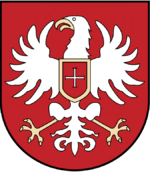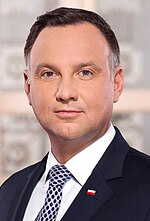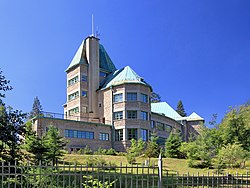President of West Miersa: Difference between revisions
No edit summary |
mNo edit summary |
||
| Line 26: | Line 26: | ||
|abolished = | |abolished = | ||
|succession = | |succession = | ||
|deputy = [[Minister-President of West Miersa]] | |deputy = [[Minister-President of West Miersa]] (1936-2021)<br>[[Vice-President of West Miersa]] (2021-) | ||
|salary = | |salary = | ||
|website = | |website = | ||
Revision as of 23:10, 3 October 2021
| President of West Miersa | |
|---|---|
 Emblem | |
| Term length | Two terms (maximum, five-year terms) |
| Constituting instrument | Constitution of West Miersa |
| Inaugural holder | Świętosław Wojdyla |
| Formation | 3 October, 1936 |
| Deputy | Minister-President of West Miersa (1936-2021) Vice-President of West Miersa (2021-) |
The President of the Miersan Sotirian Republic (Miersan: Prezydent mierskiej rzeczpospolitej sotyrskiej), commonly known as the President of West Miersa (Prezydent Mierski Zachodniej) is the head of state of the Miersan Sotirian Republic. Created in 1936 with the establishment of West Miersa, it was constitutionally defined as being the head of state, but over the decades has also become the de-facto head of government.
With the passage of the third amendment to the West Miersan constitution in October 2020, the Presidency will become an executive presidency from the 2021 general election, with the position of Minister-President being abolished in favour of a new Vice-Presidency.
History
With the independence of West Miersa from Soravia following the implementation of the Godfredson Plan in 1936, the drafters of the West Miersan constitution sought to create a head of state modelled on the Soravian Presidency, elected every five years by the people of the Miersan Sotirian Republic. However, unlike Soravia, the framers decided to institute term limits, with each President only being re-elected once.
Although the Presidency was not intended to be as centralised as the Soravian Presidency, with powers being distributed to the legislature and the voivodeships, following the accession of Świętosław Wojdyla to the Presidency in 1936, Wojdyla centralised powers in the Presidency, enabling a domination of West Miersan politics by the Wojdyla family from independence until 1986: by the time of the Miersan War in 1979, the President was by far the de-facto head of government, with the Minister-President effectively being a puppet of the President.
In the 2000s, many of the de-facto powers of the Presidency were "granted" to the Minister-President by Tomisław Sobolewski, who delegated powers to Oskar Palubicki. However, following the election of Gerard Wojdyla to the Minister-Presidency in 2011, Sobolewski and Gerard Wojdyla engaged in a power struggle that ultimately lead to Sobolewski resigning in 2013 after the Soravian government backed Wojdyla. However, in 2016, after Wojdyla was succeeded as President by incumbent Sylwester Wrzesiński, Wrzesiński was able to reverse the liberalisation made by Sobolewski.
Role
Under the West Miersan constitution, the President functions as the head of state of the Miersan Sotirian Republic, with the power to sign legislation into law, to appoint and dismiss the Minister-President of the Miersan Sotirian Republic from among the National Assembly, and to appoint legislators to represent what the West Miersan government considers to be "voivodeships under Kirenian occupation."
In addition, the President of the Miersan Sotirian Republic has an obligation to represent all Miersans, both within the Miersan Sotirian Republic, but also on the international stage.
Although officially, the President is merely the head of state, over the decades, particularly during the Wojdyla family's domination of West Miersa from 1936 until 1986, power has been de-facto centralised in the presidency, with most of the powers legally assigned to the Minister-President often being exercised by the President's office. While some presidents, most notably Tomisław Sobolewski and Gerard Wojdyla have allowed the Minister-President to exercise their powers, this has generally been the exception rather than the norm.
Official residence
The President of the Miersan Sotirian Republic has an official residence in the capital city of West Żobrodź, known as the Żobrodź Castle.
Historically, this was the residence of the royal family of Miersa, serving as one of their residences up until the start of the Interregnum in 1623. Following the end of the War of the Miersan Succession, it became the residence of the dukes of Żobrodź, remaining until 1687, when the Duchy of Żobrodź was abolished. Throughout the next two-and-a-half centuries, Żobrodź Castle served as the residence for various officials, although due to its location near the border with the Gaullican-controlled regions of Miersa, the Soravians prefered to set their capital in Krada.
Following the independence of the Miersan Sotirian Republic from Soravia in 1936, Żobrodź Castle quickly became the official residence of the presidency, serving in this role continuously since then, with the exception of the Miersan War, when after the fall of Żobrodź, the residence ended up under eastern control. The castle was severely damaged, and in the aftermath, had to be rebuilt, although the reconstruction was not faithful to the original designs, as the then-President sought to modernize the castle to make it more comfortable for his family, and equipping the offices with the latest technologies as was in existence at the time.
List of Presidents

Living former Presidents
Since the election of Adrian Rozak to the Presidency in 2021, there have been four living former Presidents of the Miersan Sotirian Republic.
Damian Jackowiak
served 1996-2006
born 1943 (age 81)Tomisław Sobolewski
served 2006-2013
born 1954 (age 70)Gerard Wojdyla
served 2013-2016
born 1959 (age 65)Sylwester Wrzesiński
served 2016-2021
born 1949 (age 75)
















